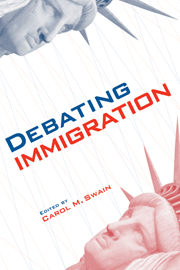Book contents
- Frontmatter
- Contents
- About the Contributors
- Preface
- Acknowledgments
- 1 Introduction
- PART I PHILOSOPHY AND RELIGION
- PART II LAW AND POLICY
- PART III ECONOMICS AND DEMOGRAPHICS
- PART IV RACE
- PART V COSMOPOLITANISM
- 16 The Free Economy and the Jacobin State, or How Europe Can Cope with the Coming Immigration Wave
- 17 The Politics of Immigration and Citizenship in Europe
- PART VI CONCLUSION
- Notes
- Index
16 - The Free Economy and the Jacobin State, or How Europe Can Cope with the Coming Immigration Wave
Published online by Cambridge University Press: 05 June 2012
- Frontmatter
- Contents
- About the Contributors
- Preface
- Acknowledgments
- 1 Introduction
- PART I PHILOSOPHY AND RELIGION
- PART II LAW AND POLICY
- PART III ECONOMICS AND DEMOGRAPHICS
- PART IV RACE
- PART V COSMOPOLITANISM
- 16 The Free Economy and the Jacobin State, or How Europe Can Cope with the Coming Immigration Wave
- 17 The Politics of Immigration and Citizenship in Europe
- PART VI CONCLUSION
- Notes
- Index
Summary
Americans and Europeans tell themselves different immigration stories. Although it is in fact exceedingly difficult to migrate legally to the United States, and U.S. immigration policy was shot through with racist intent until the 1960s, immigration is a basic part of the country's founding myths. By contrast, with the partial exception of France, European nation-states did not base their identity on immigration. The point here is conceptual: it was always grating to see scholars, often with undisguised glee at their cleverness, point out the supposed contradiction between Germany's official claim that it was “not a country of immigration” and the reality of substantial migration. There was in fact no contradiction: the statement was about whether Germany derived its identity from immigration and whether immigration was wanted. It did not, and it was not. Neither Germany nor the rest of Europe pursued a policy of encouraging immigration; on the contrary, all European countries pursued until recently the chimerical goal of zero immigration.
This is now changing. Since the late 1990s, all governing parties in several European countries – the United Kingdom, France, Germany, Italy, and Spain – have changed their rhetoric, attitude, and policy toward immigration. They have good reason to do so. If the demographers are right (and they have been spectacularly wrong about most things over the last century, so the “if” is not rhetorical), Europe will need much more immigration to stave off population decline.
- Type
- Chapter
- Information
- Debating Immigration , pp. 223 - 236Publisher: Cambridge University PressPrint publication year: 2007
- 4
- Cited by

